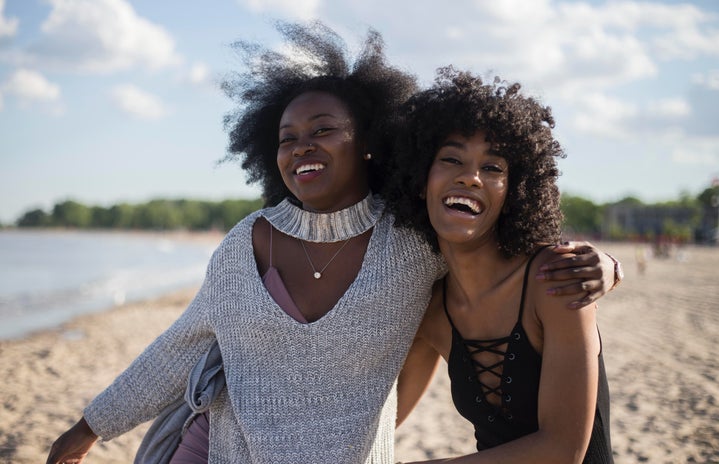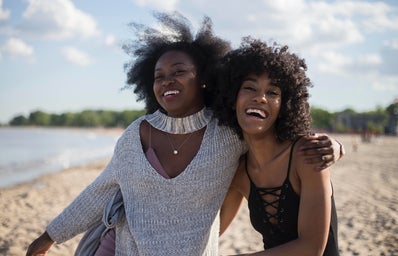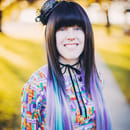Am I Venezuelan-American or American-Venezuelan? I don’t think I will ever know which identity will be my first, because I never fully stand on one side of the spectrum.
September 6, 2001: All my toys are in a single luggage, at least all the ones mom allowed me to take with me. There was a woman in black using an odd stick to rummage through my things. Why was she taking out my toys from the luggage? They were mine.
My mom held my hand tightly finger trembling and whispered to me, “Calladita mami.”
The woman in black eyed us, her dark brown eyes analyzing our movements, our reactions. She had my toys; my dad and mom bought me those toys. Her mouth moved and a strange sound emitted. I looked at my mom and her eyes glossed. The woman in black zipped my luggage, filled with my toys and next thing I know mom and I were in a room. Yellow lights buzzed, and there were eight chairs, a desk and a man in black.
“Calladita mami.” My mom’s hands are still gripping mine, trembling. Time moved slowly. I sat on a chair. My mom talked to people in black. I was restless. Then I finally asked, “Y papá?”
I was six. At six years old, my struggle to find my identity began.
I was born in Venezuela but my life has been in America, and yet I’ve been told I am not an American. After 16 years of living in a country, I am still considered an outsider, an immigrant, an unwanted American.
Who am I? My mom says I am an American, too American for the people in Venezuela. My mom says I am a Venezuelan, too Hispanic for the people in America.
Something that is not taught in schools is how difficult it is to be a child immigrant. You’re expected to act as an American in culture and values, but to remember that you are not an American; you are an immigrant from a foreign country.
I spent years denying I was from Venezuela so I can be deemed an American. Constant lies to others, but often to myself.
“Where are you from?”
America.
“Where were you born?”
America.
“What’s your first language?”
American English.
When my younger brother was born, I hated him. He was born in America, so he truly was an American. Not an outsider. Not an immigrant. Not an unwanted American. At eight years old, all I wanted was to be considered a person in the country I lived in.
Being Venezuelan was an insult to my ears and yet it was all I ever was once I passed through the door of my home. At home I spoke Spanish, I said bendicion, I ate arepas, empanadas, cachapas, carne mechada, platanos and everything in between. I oozed Venezuelan culture, but the moment I stepped out of my home, I once again denied that I was even born in Venezuela.
I returned to Venezuela 11 years after I had arrived in America. I was welcomed with open arms to a family I did not remember. To cousins who knew my name but not my face, to homes that had stayed the same after my departure. In Venezuela I was referred to as “La Americana” by family members, and people who claimed to have known me. In what was considered my country of origin, my home country, my nationality, I was not welcomed either.
I was too Americanized for Venezuela.
I was too Venezuelan for America.
I did not belong anywhere.
May 17, 2015: I stepped off the plane, my legs throbbed. The words around me were foreign yet I knew exactly what it said. I followed the crowd of drained travelers and join the herd in a massive room with people in black.
It was my turn. I handed over a brown passport and a green card. The man in black looked quickly at my green card and handed it back, “You don’t need this.” I clenched the card in my hand as I watched my brown passport get stamped.
Several days went by and I received the dreaded question.
“Where are you from?”
America.
“Okay, but where were you born?”
America.
“You don’t look American.”
I know, because I am actually from Venezuela.
“Oh? Really?! So you speak Spanish and English?!”
Yes.
“That’s so amazing, I wish I could be from two places.”
What?
It took a single person, a single compliment, a single moment and the glass wall I had put between my two identities shattered. This person was neither American or Hispanic. This person was Japanese and she wished she could have two identities.
As the glass wall laid by my feet, the six-year-old me said, “I am American. I come from the continent of America, I am from Venezuela and American. I am both, not one. Both.”
Identity; the fact of being who.
Who are you? Who am I?
I am a person. I am a girl. I am a girl who was born in Venezuela but lives in America. I am a girl who has an advantage than the average American and the average Venezuelan. I am a girl who is trilingual. I am a girl with many dreams and goals. I am a girl who thinks in English but expresses herself with Spanish gestures. I am a girl who got sorted into both Hufflepuff and Ravenclaw.
I am an American-Venezuelan. I am a Venezuelan-American. The order only depends on the language that I vocalize.
In the end my identity is more than a place. My identity is not a single word. My identity is a feeling, a being, a paragraph. I have learned that identity is not where I am but who I am.


